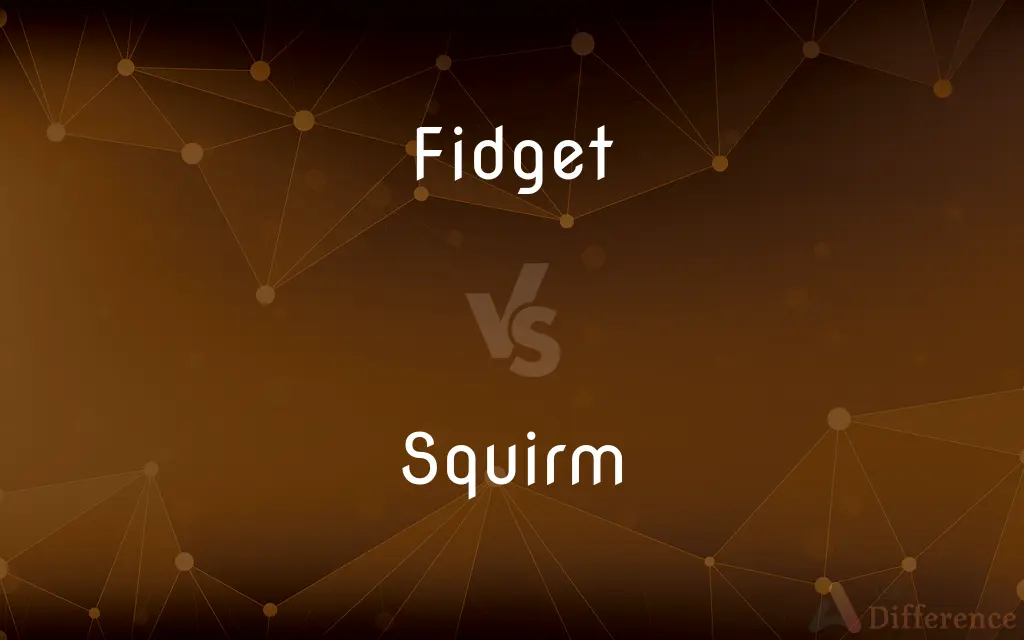Fidget vs. Squirm — What's the Difference?
By Tayyaba Rehman — Updated on September 22, 2023
Fidget refers to making small movements, often with hands or feet, due to nervousness or impatience, while Squirm means to twist one's body with discomfort or embarrassment.

Difference Between Fidget and Squirm
Table of Contents
ADVERTISEMENT
Key Differences
Fidget and Squirm, while both indicating restless movement, differ in context and intensity. When someone Fidgets, they might display subtle, often repetitive motions like tapping a foot or playing with an object in hand, revealing unease or impatience. Squirming, conversely, involves a more pronounced and sometimes conspicuous movement, often as a result of discomfort or embarrassment.
For example, during an important meeting, someone might Fidget with their pen, signifying anxiety or boredom. On the other hand, someone might Squirm in their chair when confronted with an awkward situation, revealing their eagerness to escape or alleviate the discomfort.
Another key difference lies in the body parts involved. Fidgeting predominantly involves smaller parts like fingers, hands, or feet, whereas Squirming typically involves larger body movements, including the torso. A person might Fidget by shaking their leg, while they'd Squirm by wriggling their whole body.
In summary, while both Fidget and Squirm suggest restlessness, Fidgeting typically stems from nervousness or impatience and involves minor movements, whereas Squirming arises from discomfort or embarrassment and consists of more noticeable body wriggling.
Comparison Chart
Definition
Small, restless movements
Twisting of the body due to discomfort
ADVERTISEMENT
Context
Nervousness, impatience
Discomfort, embarrassment
Intensity
Subtle, often repetitive
Pronounced, conspicuous
Body Parts Involved
Hands, feet, fingers
Larger parts, including torso
Typical Situation
Waiting in line, during meetings
Confronted with awkward situations, physical discomfort
Compare with Definitions
Fidget
Displaying unease through small actions.
He would always Fidget when lying.
Squirm
Moving restlessly due to discomfort.
He would Squirm under her intense gaze.
Fidget
Handling something aimlessly.
She'd Fidget with her phone when nervous.
Squirm
Trying to escape an awkward situation.
She Squirmed in her chair during the embarrassing story.
Fidget
Make small movements, especially of the hands and feet, through nervousness or impatience
The audience began to fidget and whisper
Squirm
Displaying unease through pronounced movements.
He Squirmed when confronted about the missing money.
Fidget
A person who fidgets.
Squirm
Shifting position frequently.
The dog would Squirm when trying to get comfortable.
Fidget
To behave or move nervously or restlessly.
Squirm
Squirm is a 1976 American natural horror film written and directed by Jeff Lieberman, starring Don Scardino, Patricia Pearcy, R. A. Dow, Jean Sullivan, Peter MacLean, Fran Higgins and William Newman. The film takes place in the fictional town of Fly Creek, Georgia, which becomes infested with carnivorous worms after an electrical storm.
Fidget
To play or fuss; fiddle
He fidgeted with his notes while lecturing.
Squirm
Wriggle or twist the body from side to side, especially as a result of nervousness or discomfort
He looked uncomfortable and squirmed in his chair
Fidget
To cause to behave or move nervously or restlessly.
Squirm
A wriggling movement
The toddler gave a sudden squirm
Fidget
Fidgets A condition of restlessness as manifested by nervous movements. Often used with the
A bored child who had the fidgets.
Squirm
To twist about in a wriggling, snakelike motion; writhe.
Fidget
One that fidgets.
Squirm
To feel or exhibit signs of humiliation or embarrassment.
Fidget
(intransitive) To wiggle or twitch; to move the body, especially the fingers, around nervously or idly.
Squirm
The act of squirming.
Fidget
(transitive) To cause to fidget; to make uneasy.
Squirm
A squirming movement.
Fidget
A nervous wriggling or twitching motion.
Squirm
To twist one's body with snakelike motions.
The prisoner managed to squirm out of the straitjacket.
Fidget
(informal) A person who fidgets, especially habitually.
Squirm
To twist in discomfort, especially from shame or embarrassment.
I recounted the embarrassing story in detail just to watch him squirm.
Fidget
A toy intended to be fidgeted with.
Squirm
To evade a question, an interviewer etc. en
Fidget
To move uneasily one way and the other; to move irregularly, or by fits and starts.
Squirm
A twisting, snakelike movement of the body.
Fidget
Uneasiness; restlessness.
Squirm
To twist about briskly with contortions like an eel or a worm; to wriggle; to writhe.
Fidget
A general nervous restlessness, manifested by incessant changes of position; dysphoria.
Squirm
The act of wiggling
Fidget
A feeling of agitation expressed in continual motion;
He's got the fidgets
Waiting gave him a feeling of restlessness
Squirm
To move in a twisting or contorted motion, (especially when struggling);
The prisoner writhed in discomfort
The child tried to wriggle free from his aunt's embrace
Fidget
Move restlessly;
The child is always fidgeting in his seat
Squirm
To wiggle or twist the body.
The child began to Squirm during the dentist's check-up.
Fidget
Making minor restless movements.
She began to Fidget with her necklace during the interview.
Fidget
Repetitive motion due to impatience.
Children tend to Fidget when they're bored.
Fidget
Small shifts or adjustments in position.
He'd Fidget in his seat during the long flight.
Common Curiosities
Which is more repetitive, Fidget or Squirm?
Fidgeting is usually more repetitive, like tapping a foot, while Squirming is more about shifting or wriggling in response to discomfort.
Can someone Fidget without being aware of it?
Absolutely, many people Fidget subconsciously. Squirming, however, is often more deliberate.
Is Fidget always a sign of nervousness?
No, while often linked to nervousness, Fidgeting can also stem from boredom or impatience. Squirming usually indicates discomfort.
Is Squirm more noticeable than Fidget?
Typically, yes. Squirming involves larger body movements, making it more evident than Fidgeting.
Can Squirming be due to physical discomfort?
Yes, people might Squirm due to physical unease, while Fidgeting is more about mental restlessness.
Are there tools to help with Fidgeting?
Yes, items like Fidget spinners or cubes are designed to help people channel their restlessness. Squirming, however, usually addresses a specific discomfort.
Share Your Discovery

Previous Comparison
Row vs. Line
Next Comparison
Memory vs. StorageAuthor Spotlight
Written by
Tayyaba RehmanTayyaba Rehman is a distinguished writer, currently serving as a primary contributor to askdifference.com. As a researcher in semantics and etymology, Tayyaba's passion for the complexity of languages and their distinctions has found a perfect home on the platform. Tayyaba delves into the intricacies of language, distinguishing between commonly confused words and phrases, thereby providing clarity for readers worldwide.














































